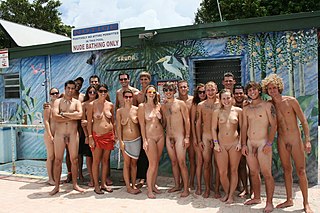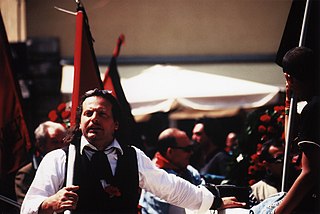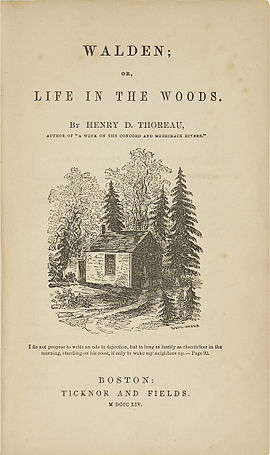Individualist anarchism is the branch of anarchism that emphasizes the individual and their will over external determinants such as groups, society, traditions and ideological systems. Although usually contrasted to social anarchism, both individualist and social anarchism have influenced each other. Mutualism, an economic theory particularly influential within individualist anarchism whose pursued liberty has been called the synthesis of communism and property, has been considered sometimes part of individualist anarchism and other times part of social anarchism. Many anarcho-communists regard themselves as radical individualists, seeing anarcho-communism as the best social system for the realization of individual freedom. Economically, while European individualist anarchists are pluralists who advocate anarchism without adjectives and synthesis anarchism, ranging from anarcho-communist to mutualist economic types, most American individualist anarchists advocate mutualism, a libertarian socialist form of market socialism, or a free-market socialist form of classical economics. Individualist anarchists are opposed to property that gives privilege and is exploitative, seeking to "destroy the tyranny of capital – that is, of property" by mutual credit.

Naturism is a lifestyle of practising non-sexual social nudity in private and in public; the word also refers to the cultural movement which advocates and defends that lifestyle. Both may alternatively be called nudism. Though the two terms are broadly interchangeable, nudism emphasizes the practice of nudity, whereas naturism highlights an attitude favoring harmony with nature and respect for the environment, into which that practice is integrated. That said, naturists come from a range of philosophical and cultural backgrounds; there is no single naturist ideology.
Anarcho-primitivism is an anarchist critique of civilization that advocates a return to non-civilized ways of life through deindustrialization, abolition of the division of labor or specialization, and abandonment of large-scale organization and high technology. Anarcho-primitivists critique the origins and progress of the Industrial Revolution and industrial society. According to anarcho-primitivism, the shift from hunter-gatherer to agricultural subsistence during the Neolithic Revolution gave rise to coercion, social alienation and social stratification.
Green anarchism is an anarchist school of thought that puts a particular emphasis on ecology and environmental issues. A green anarchist theory is normally one that extends anarchism beyond a critique of human interactions and includes a critique of the interactions between humans and non-humans as well. Beyond human liberation, green anarchist praxis can extend to some form of non-human, total liberation and an environmentally sustainable anarchist society.
Anarchism in Spain has historically gained some support and influence, especially before Francisco Franco's victory in the Spanish Civil War of 1936–1939, when it played an active political role and is considered the end of the golden age of classical anarchism.

Isaac Puente Amestoy, born in Las Carreras near Biscay, was a Basque physician and Spanish anarchist of a strong anarchist communist bent, who adhered to concerns around birth control, hygiene and sexuality. He promoted anarcho-naturism, and was active in the Confederación Nacional del Trabajo (CNT).
Anarchism without adjectives, in the words of historian George Richard Esenwein, "referred to an unhyphenated form of anarchism, that is, a doctrine without any qualifying labels such as communist, collectivist, mutualist, or individualist. For others, [...] [it] was simply understood as an attitude that tolerated the coexistence of different anarchist schools".

Anarchism in France can trace its roots to thinker Pierre-Joseph Proudhon, who grew up during the Restoration and was the first self-described anarchist. French anarchists fought in the Spanish Civil War as volunteers in the International Brigades. According to journalist Brian Doherty, "The number of people who subscribed to the anarchist movement's many publications was in the tens of thousands in France alone."
The following outline is provided as an overview of and topical guide to anarchism, generally defined as the political philosophy which holds the state to be undesirable, unnecessary and harmful, or alternatively as opposing authority and hierarchical organization in the conduct of human relations. Proponents of anarchism, known as anarchists, advocate stateless societies or non-hierarchical voluntary associations.
Individualist anarchism in Europe proceeded from the roots laid by William Godwin and soon expanded and diversified through Europe, incorporating influences from individualist anarchism in the United States. Individualist anarchism is a tradition of thought within the anarchist movement that emphasize the individual and his or her will over external determinants such as groups, society, traditions, and ideological systems. While most American individualist anarchists advocate mutualism, a libertarian socialist form of market socialism, or a free-market socialist form of classical economics, European individualist anarchists are pluralists who advocate anarchism without adjectives and synthesis anarchism, ranging from anarcho-communist to mutualist economic types.
Henri Zisly was a French individualist anarchist and naturist. He participated alongside Henri Beylie and Émile Gravelle in many journals such as La Nouvelle Humanité and La Vie Naturelle, which promoted anarchist-naturism.
Émile Gravelle (1855–1920) was a French individualist anarchist and naturist activist, writer and painter. He published the review L'État Naturel (1894–1898) and collaborated with Henri Zisly and Henri Beylie on La Nouvelle Humanité, Le Naturien (1898), Le Sauvage (1898–1899), L'Ordre Naturel (1905), and La Vie Naturelle (1907–1914). His ideas were important in individualist anarchist circles in France as well as Spain, where Federico Urales promoted the ideas of Gravelle and Zisly in La Revista Blanca (1898–1905).
Paul Joseph Edmond Carton was a French physician and practitioner of vegetarianism.
Synthesis anarchism, synthesist anarchism, synthesism or synthesis federations is a form of anarchist organization that seeks diversity upon its participants and tries to join anarchists of different tendencies under the principles of anarchism without adjectives. In the 1920s, this form found as its main proponents the anarcho-communists Voline and Sébastien Faure, bringing together anarchists of three main tendencies, namely individualist anarchism, anarchist communism and anarcho-syndicalism. It is the main principle behind the anarchist federations grouped around the contemporary global International of Anarchist Federations.
Anarchism in Venezuela has historically played a fringe role in the country's politics, being consistently smaller and less influential than equivalent movements in much of the rest of South America. It has, however, had a certain impact on the country's cultural and political evolution.
Henri Félix Camille Beaulieu was a French accountant, naturist, anti-militarist, anarchist and then communist. He wrote many articles in radical journals. In his later years he was active in the Committee of Social Defence (CDS), an organization that helped political prisoners and exiles.
Anarchism is the political philosophy which holds ruling classes and the state to be undesirable, unnecessary and harmful, or alternatively as opposing authority and hierarchical organization in the conduct of human relations.
Libertarian possibilism was a political current in early-20th-century Spanish anarchism that advocated achieving the anarchist ends of ending the state and capitalism by participation in structures of contemporary parliamentary democracy. The name of the political position appeared for the first time between 1922 and 1923 within the discourse of the Catalan anarcho-syndicalist Salvador Seguí when he said, "We have to intervene in politics in order to take over the positions of the bourgeoisie".

Georges Butaud was a French individualist anarchist and veganism activist. He advocated naturist anarchism and founded an early vegan restaurant in Paris.

Louis Rimbault was a French individualist anarchist and promoter of simple living and veganism.







